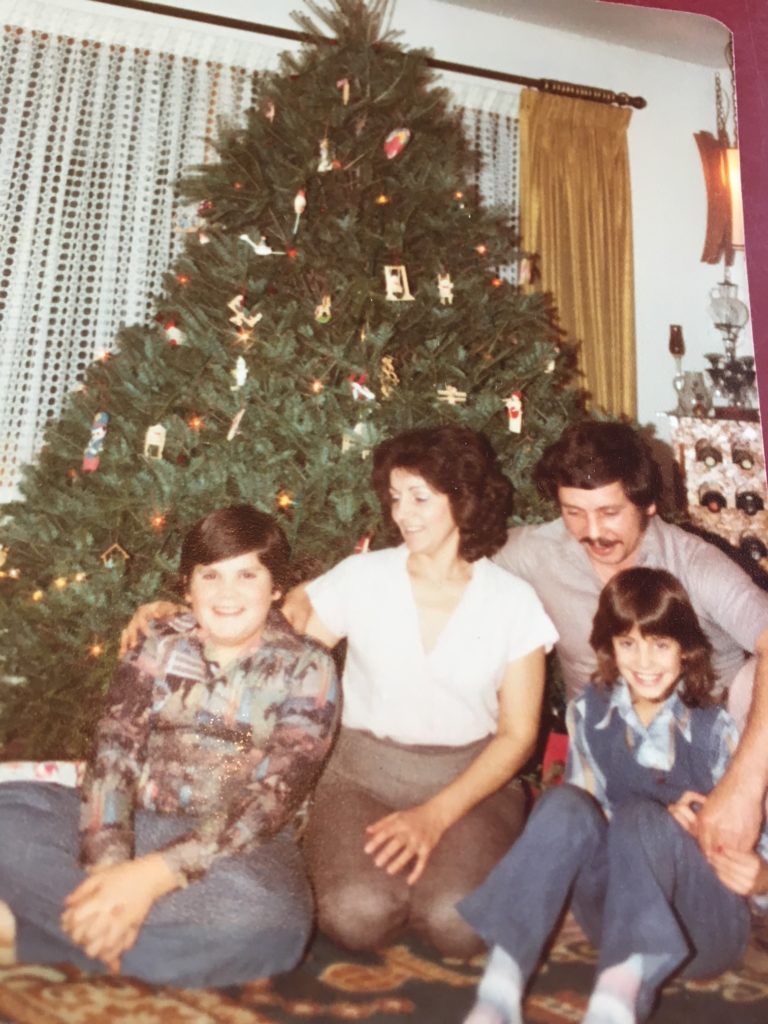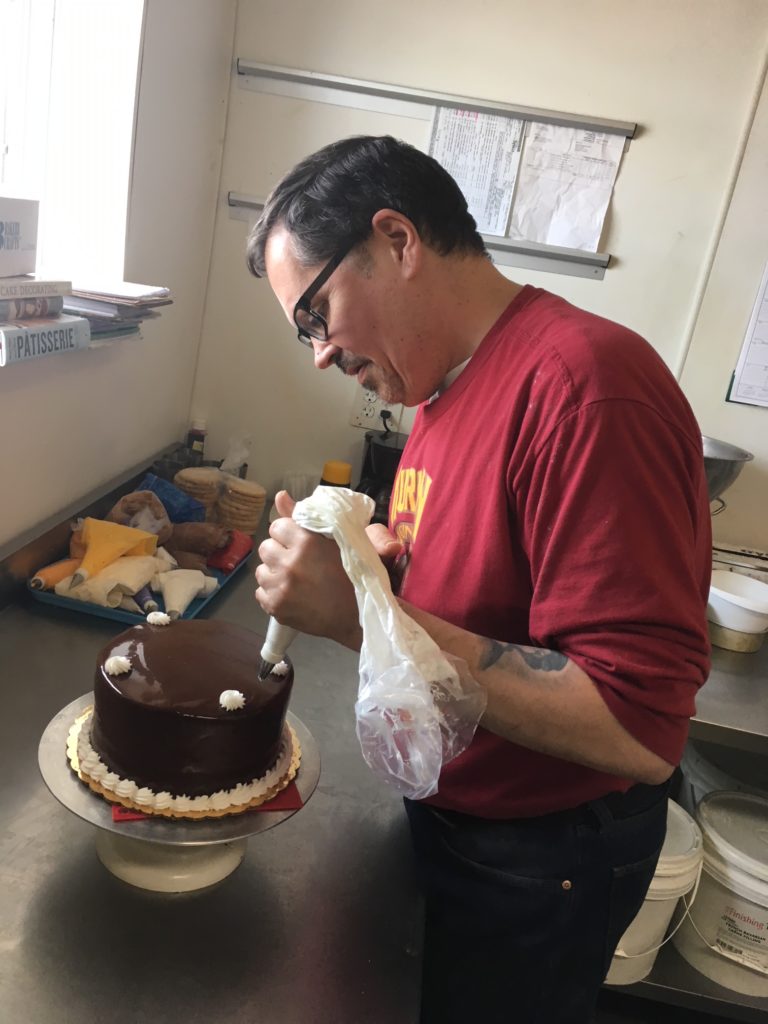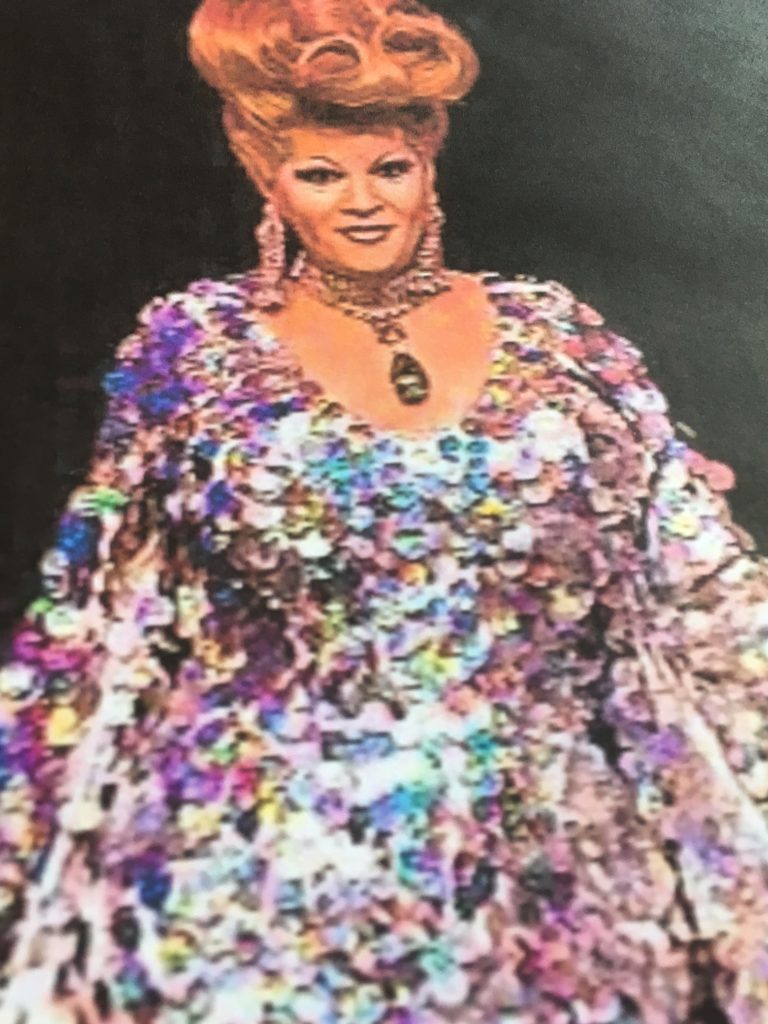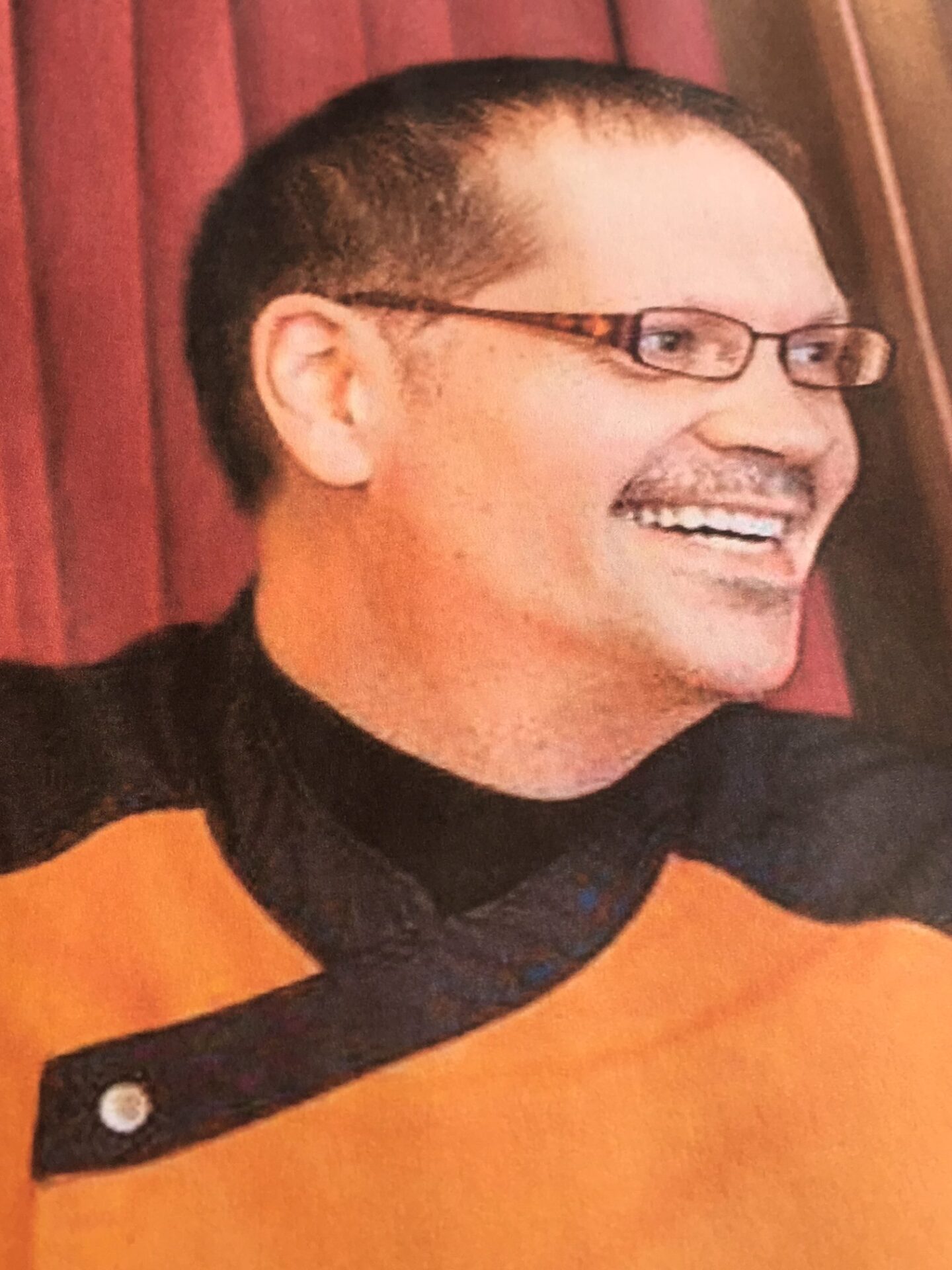Joe Heck is a split personality–split three ways. He’s probably the Upper Peninsula’s best known baker, Joe the Cake Guy; he’s also Joey Black, the flamboyant drag queen, and then in his off-time, he’s Joe Heck, a self-described boring homebody. He’s managed to balance the three personalities while also overcoming the trauma of a longtime partner being murdered, followed by a yearlong drug addiction.
BC: Joe, I understand you were you born in the U.S., but your parents were immigrants?
JH: Yeah, I was born in Muskego, Wisconsin–that’s about ten minutes outside of Milwaukee–just a little Leave It to Beaver neighborhood with a half acre of land, a little brick house. My dad was born and raised in Germany, he’s still a German citizen, and my mom was born and raised in Cuba and she’s still a Cuban citizen.
BC: How did they meet?
JH: Well, my aunt Nene met an import-export gentleman from Milwaukee…they met in Havana…and she moved to Milwaukee with him. He was from Germany. So when my mom’s parents could tell that things weren’t going well in Cuba (Castro’s takeover), they started sending their kids over to the United States. My mom was 13 at the time, and when she got to Milwaukee, she moved in with my aunt Nene and Uncle Walter. And her only social outlet was the dances at the German hall. And that’s where she met my dad.
BC: So back to you. You grew up in Muskego?
JH: Same house my whole life. My mom saved up to buy the land. She was a waitress at Dutchland Dairy and she saved up to buy this little half acre plot of land. She and my dad built the house, and when they got divorced, my sister Ingrid bought the house and raised her family there, and still lives there.
BC: So you lived in the same house your entire childhood?
JH: My entire childhood. I was one of those lucky kids who never moved. The same school from kindergarten to graduation.

BC: What was your childhood like?
JH: (He laughs) For what I am now, it was surprisingly normal. We were middle class–we never wanted for anything–but we understood the value of a dollar. I think having immigrant parents…my dad was foreman of a foundry, he worked hard every day of his life. Mom worked at a restaurant until she finally got a restaurant of her own. She worked at the restaurant six days a week. She would go there in the morning after she got us off to school…then she would come home between lunch and dinner service to make sure we got off the bus and had food, and then go back to work at night after my dad got home. So I think part of what I am today is because of their really strong work ethic.
BC: Were they strict parents?
JH: We had a proper upbringing. I don’t think it was a strict, stern upbringing that you might think we’d have with German or Latin parents, but we were raised right. We knew what was right and wrong. We knew you did not talk back to your parents.
BC: Siblings?
JH: Yeah, I’m the middle kid. I have an older sister Ingrid, and a younger sister Monica (MOH-nica)
BC: What were you like as a boy? What kind of interests did you have?
JH: I was always kind of artsy. I love to draw, I loved to read, I loved to write. And we were lucky because my dad always loved a good toy so we had snowmobiles and a minibike and a cabin up north. A house that he built by himself with no indoor plumbing. But I was always a pretty introverted kid.
BC: Sports?
JH: I was actually the state wrestling champ my junior and senior year. I wrestled as a heavyweight–I was a fat kid. But that was pretty much it. I didn’t really try out for team sports. But I was also a Cub Scout, Boy Scout, Eagle Scout!

BC: So you graduate high school. Then what?
JH: After my parents got divorced, my mom’s second husband got transferred to New Jersey, so I went out there–I’ve always been a Mama’s boy–and I got a job. First job I could find was as an overnight baker. I always knew I wanted to be involved in food but I’m allergic to shellfish, so I knew I wasn’t going to be that kind of cook. Baking wasn’t really on my radar, and back then baking wasn’t the big, glamorous thing it’s become. But I enjoyed it a lot, the artistic side to it. So when the donuts were proofing or the bread was rising, I’d take some of the icing and decorate cakes or cupcakes for the case.
And this lady who owned an upscale bakery came in one day and asked who the new decorator was, and I told her, “Oh, it’s just me. I’m just playing around.” So I talked with her for a few weeks and she said “Hey, I have a proposition for you. If you promise to work for me five years afterward, I’ll pay for your education for two years,” and so she sent me to the Culinary Institute of America. And I ended up working for her for 13 years and I apprenticed under some of the best decorators in the entire world. I just kind of fell into it.
BC: What is it about baking that appeals to you?
JH: Baking people or dessert people are the craziest people in the kitchen because you have to have a dual personality. The baking part of it is super scientific–you need exact measurements, you need to know the chemistry and science. Its not like making a sauce and you can add a little more of this or that. It’s a science. And then on the other end of it, the decorating, there’s no rules, and if you do try to follow certain rules, you’re not going to be successful because you have to be a crazy artist.
BC: So you were baking and decorating on the East Coast. How’d you end up in Marquette?
JH: Well, my best friend in the world, Tim, was born and raised up here, and I met him in Milwaukee. The very first college drag show in the Midwest was here at NMU. Twenty two years ago. The college actually sponsored the drag show. And because Tim went to NMU, they asked us to do it, and I, like so many people, had in mind that Marquette was a place with two farms and a couple of shacks. And I wondered, “Where are we going?” We really didn’t know what the hell we were getting into. But we ended up doing the drag show, and 500 people showed up, and it was an amazing experience. And so I’d come up and visit Tim a lot, but then my partner got murdered, and then I went through a really bad time–a severe addiction with rock cocaine…I went through nearly a quarter million dollars of “stuff” in a year…But then I had to make a decision to be a better person or not. And I decided to get away, to leave New York. I went to Milwaukee with my tail between my legs, and my family helped me out. But I kicked the habit, and then knew I needed a fresh new start. Tim had moved back to Marquette to be with his parents, and said to me, “Hey, why don’t you come up here to Marquette?” That was 17 years ago. I came up here, and never left.
BC: All right. You mentioned, almost in passing, that your partner was murdered. What happened?
JH: He was beaten to death. He was beaten on Thanksgiving, and then after three months, he finally passed. It was a gay bashing. We were coming out of a club in Washington DC. It happened while I was waiting at coat check with a friend of mine, and both of our partners were being beaten outside. His partner survived but still to this day has some brain damage. And back in those days, there was no such thing as “hate crimes” so it was just considered a mugging. And the people were never caught. We had been together for 12 years.
BC: So, it sounds like you fell apart after that.
JH: Yeah, instead of dealing with it, I said, “I’ll be fine” but I met the wrong people and fell into a drug habit. So for about a year, I lost everything.
BC: How’d you snap out of it?
JH: I was out of our loft, I’d lost all our money, and I was lying there in a residence hotel at three in the morning, and I was out of drugs. And I called my sister Ingrid in Milwaukee–I hadn’t called my family in 6-7-8 months–and said, “Things are not good, and if I don’t do something, I’m gonna end up dead.”
BC: So you finally left New York and ended up back in Marquette.
JH: There was no baking scene here back then so I took the first job I could get, and I waited tables at the Village Cafe serving two pounds of hash browns on Sunday mornings. I’m a schmoozy personality and I made good money and met a lot of people. And then I heard there was a job opening at Gophers, and Patrick and Jackie Gonda brought me on, and I started making a name for myself and for Gophers.
BC: You eventually made your way over to the Landmark Inn.
JH: Yeah, Christine (Pesola, the former owner) saw enough in me to hire me and that’s how Joe’s Cakes was born at the Landmark. That was 13 years ago.

BC: And then came the Huron Mountain Bakery, your current employer.
JH: Two and a half years ago. I love it here.
BC: You’ve been known for several years as Joe the Cake Guy. What gives you the greatest thrill as a baker?
JH: This sounds like the geekiest thing in the world. But when I happen to be up front here (at Huron Mountain Bakery) and a customer says, “Hi Joe!” and it turns out I did their wedding cake six years ago and they remember my name, and they’re coming in to get a raspberry bomb because it’s become a tradition, and it’s…no matter how many hundreds of cakes you made, the one you made for that person or that couple was special and they’ll always remember it and remember me. Yeah, that’s pretty cool.
BC: Okay, what’s been your most embarrassing moment as a baker?
JH: It was back in New Jersey and my friends were getting married, and the wedding cake was going to be my wedding gift. Now at that time, I hadn’t been trained enough to do the wedding cakes or even deliver them, but I figured I could do it. I put it together at my own house but there was no internet back and I didn’t realize you needed a support system inside for all the layers of the cake. You just don’t stack cake on top of itself. (He laughs) But I managed to bake it and then I loaded it in the back of a station wagon. But then as we’re going across the Ben Franklin Bridge into Philadelphia…in August…I glance in the back…and notice that the cake is doing like this (he motions with his hands)…drop down. So we pull over, there’s no parking on the bridge, we’re actually in a driving lane. We just put on the flashers, and I run into the back, and suddenly I’m wrist-deep into the bottom layer of the cake trying to make sure it doesn’t totally collapse. Well, we finally got to the wedding reception, and everybody said the cake was good, but it was really three kind-of-okay-looking tiers, and then one that was smooshed. So I learned that not everything is as easy as it looks.
BC: Now, how about the other, wilder side of Joe Heck. When did you realize you were gay?
JH: I really didn’t think much about any of that until I was maybe ten or eleven. And then it was always in the back of my head but I think I was afraid of it. This was, like, 1977-78. It was a huge difference from what it’s like today. I don’t know where I heard it but I remember someone saying “It’s just a phase” so I never really stressed myself out about it. But then I guess I finally realized it wasn’t just a phase. I was 17 years old, 1982 or 1983, when it was still a big deal–and that’s when I first said it out loud to a friend. So that was it.
BC: What about Mom and Dad?
JH: I didn’t have to tell Mom. She just kind of knew and figured it out. I pride myself on knowing that I never lied about it. My dad? A proper German guy, we never talk about that kind of stuff anyway. So he knows, but even if I was straight, I wouldn’t talk about my romantic life with my dad. So out of respect for him, we just don’t discuss it. But my mom? She’ll help me pick out songs and outfits for the drag shows. She was the first one to ever take me to a drag show at a gay bar in Milwaukee on my 18th birthday.
BC: How did you make the transition from simply saying you were gay to deciding you wanted to appear in drag shows?
JH: First and foremost, I want to get rid of this myth: I have no desire to be woman. It would suck to have to go through the work they have to go through. I’m kind of like three split personalities. There’s Joe the Cake guy which is the schmoozy guy for everybody. Then there’s Joe–I’m very quiet, very shy, very self-conscious, very low self-esteem. Then there’s Joey Black! I put on this makeup, this wig, you can be whoever you want to be. Then I found out I got to entertain people and make people happy…and let’s be honest, having a room full of 1200 people standing up and screaming for you? It’s not such a bad thing. It started out as a dare. I did “I Enjoy Being a Girl” from Flower Drum Song, still with my beard and mustache on, and this whole thing was this boy sneaking home to put on his mom’s clothes. That was my stage shtick and I won 500 bucks back in 1986. That was a lot of money! So I did live standup comedy for the first five years in Milwaukee.

BC: And then you continued the act once you got to Marquette.
JH: It was this weird, magical transition, and now I do one drag show a year that I actually get paid for–up at Michigan Tech–but every other show I do, it’s for charities. We raise thousands of dollars for causes that I care about but could never afford to write a check for. I’ve done the Girl Scouts, we’ve done UPaws, the battered women’s shelter, the Lip Synch Battle for one U.P. hospice, I did Dancing with the Stars for another hospice…So it’s these amazing charities that aren’t at all a gay-lesbian thing. We just did a sold-out show to help revamp the Vista Theater. If the name Joey Black brings in money, it’s awesome, and it’s a whole different crowd. It’s not people in a bar. At Tech, there’s this girl who’s 13 years old, and she’s been there every year since she was in her mom’s belly. And when we used to do the shows here at NMU, I’d save the first two rows for my cake ladies, and they’re all 70 to 90 years old, and so there’s my two rows of blue-haired ladies holding up dollar bills, screaming louder than anyone else.
BC: It’s got to be gratifying seeing that kind of reaction in the U.P. which many would consider to be a pretty conservative region.
JH: Absolutely. It’s funny because when we do the big show every year, when I invite somebody new to be part of the cast, they have that preconceived notion about us….But then they come up here and they see the reception they get and just how special it is. It’s really gratifying because it’s not just gay and lesbian. It’s like in Europe where everybody goes. It’s a valid form of entertainment.
BC: So aside from baking and performing in drag shows, what does Joe Heck do in his off time?
JH: (He laughs) Honestly,I go home, hang out with Mom, cook, read books, and go out in the garden. I’m a pretty boring person. I’m a homebody.
BC: What’s the future hold for you?
JH: I think I’ll continue doing what I’m doing now for at least the next ten years. I don’t have enough money to retire quite yet. This is what I want to do. I’m really lucky to wake up every day and, even if I’m really tired, I’m doing something that I love to do. And I’m able to pay my rent, take care of people that matter to me, and buy the good treats for my cat Ella. I think I’m pretty lucky. I don’t think too many people can say that what was a job and then became a career is now truly something that makes me happy. But I can. And it sustains me.
BC: Thank you, Joe.
You got news? Email me at briancabell@gmail.com


